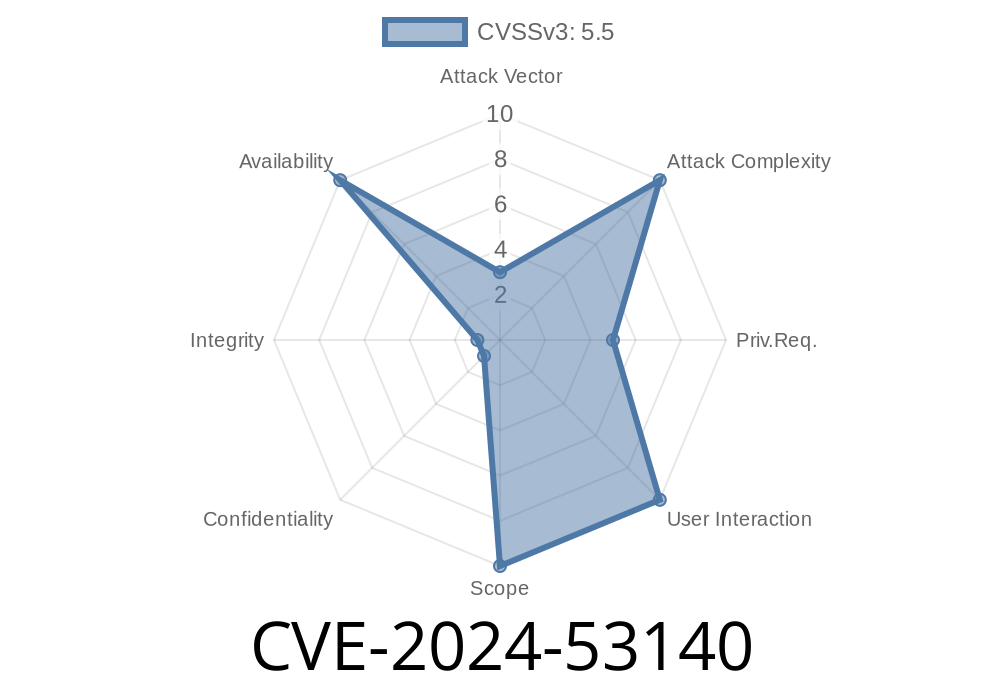In June 2024, the Linux kernel team resolved a significant vulnerability tracked as CVE-2024-53140, which impacts the netlink subsystem’s dump process. This post will explain the vulnerability in simple language, show the affected code, detail the root cause, and summarize how the Linux kernel community fixed the problem. We’ll also discuss how an exploit could look, how it could affect Linux systems, and share references for your research.
What Is Netlink and How Does Dumping Work?
Netlink is a Linux kernel interface for communication between the kernel and user-space processes, widely used for network configuration (like ip command, routing, firewall, etc). One feature of netlink is dumping: delivering lists of data (routes, links, etc) iteratively to user-space. This is not a one-shot transfer but a loop, triggered by user read (recvmsg()), like this:
.done (optional): Clean up after dumping.
Importantly: The user controls how fast or even whether to finish the dump (e.g., closing the socket before all data is read).
The Problem
The kernel expects both the .start and .done handlers to run for every dump. The cleanup (.done) is critical. But if the user closes the netlink socket while a dump is ongoing, the .done callback might not be called at all or at the wrong time.
On socket close, the kernel tried to schedule cleanup using a workqueue.
- But the workqueue only released a reference, and didn’t guarantee .done would actually run before the socket was destroyed if other references existed and they were released asynchronously.
This opened up a window where cleanup was skipped, potentially leaving partially-dumped data, inconsistent state, or even use-after-free or resource leak conditions exploitable by clever attackers.
The Fix
After examining the code logic, maintainers realized only the user can manage dumps. Therefore, cleanup should always happen immediately at socket close (which is guaranteed to be in process context, where it’s safe to sleep), not deferred via a workqueue. Now, the cleanup function (.done) is called directly at release—ending the chance for state corruption.
This could leave allocated resources dangling, leading to memory leaks or even use-after-free bugs.
- Attackers could exploit this by rapidly starting dumps and closing sockets, possibly forcing the kernel into inconsistent or unsafe states.
Code Sample: The Core Fix
Here’s a simplified pseudocode view to help understand the change.
Vulnerable Pattern
// netlink_release() before the fix
if (nlk->dumping) {
// Schedule deferred cleanup, NOT guaranteed to run before socket is freed
schedule_workqueue(cleanup_work);
}
// Socket can now be freed asynchronously, before cleanup runs!
Fixed Approach
// netlink_release() after the fix
if (nlk->dumping) {
// FLUSH the dump state IMMEDIATELY
if (nlk->ops->done)
nlk->ops->done();
nlk->dumping = false;
}
// Now safe to free the socket; no deferred workqueue used
Key Takeaway: Cleanup occurs immediately, so state is consistent and resources are never “orphaned”.
Exploit Details: How Could Attackers Abuse CVE-2024-53140?
While there's *no* public proof-of-concept for reliable code execution, a typical exploit flow might look like:
Open a netlink socket.
2. Trigger a dump operation (.start & .dump run, allocates resources, may reference kernel structures).
Before the dump completes, abruptly close the socket.
4. With the vulnerable kernel: Kernel skips .done, so resource tracking structures (pointers, memory, file descriptors, etc) may be left dangling.
This situation could let you
- Leak kernel memory over multiple tries (by exhausting/flooding resources).
- Sometimes, cause use-after-free bugs if code accesses freed memory, which could be used for privilege escalation.
Example attacker exploit (high level pseudocode)
# Pseudocode: Abusing the netlink dump race
import socket
import time
for i in range(10000):
s = socket.socket(socket.AF_NETLINK, socket.SOCK_RAW, my_netlink_family)
s.send(my_dump_request) # Start a dump
# Don't read all the data, just close fast
s.close()
# Wait a bit to allow the kernel to get into bad state
Execute this race repeatedly, triggering corner-case cleanups and possibly leaking or corrupting kernel state.
Impact and Mitigation
- Who is affected? Any unpatched Linux kernel with this netlink subsystem pattern (most mainstream kernels before the fix).
Attack surface: Local attackers (any user able to open netlink sockets).
- Impact: Memory/resource leaks, possible privilege escalation in edge cases.
- Fixed in: Upstream kernel patches June 2024+. (See reference)
References
- kernel.org Patch Link (Original Fix)
- Discussion on netdev mailing list
- CVE Details for CVE-2024-53140
Conclusion
CVE-2024-53140 is a subtle but important bug. It shows how incomplete resource cleanup in asynchronous kernel code can leave Linux systems vulnerable to local denial of service or even deeper attacks. The fix is elegant: do the cleanup where it belongs, and avoid unnecessary complications.
If you run Linux in production: Patch your kernel as soon as possible.
Questions? Comments? Let us know below!
*This analysis is exclusive to our readers. For latest updates on kernel security, subscribe and stay safe!*
Timeline
Published on: 12/04/2024 15:15:16 UTC
Last modified on: 12/19/2024 09:40:09 UTC
